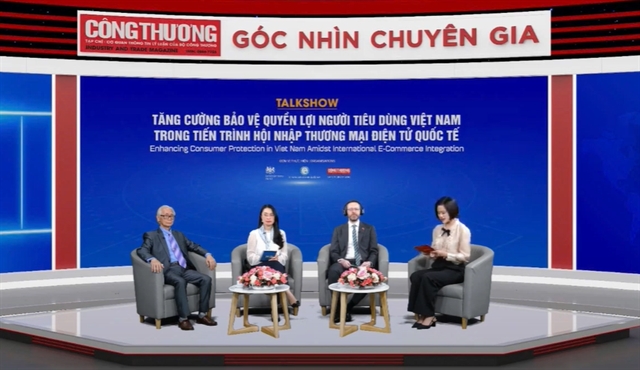 Economy
Economy

 |
| Young people host a livestream shopping event on the social media platform TikTok from a mobile phone. The revised Law on Protection of Consumer Rights supplements several provisions in favour of consumers, compared to the previous version of the law from 2010. — VNA/VNS Photo Trần Việt |
HÀ NỘI — Vice Chair of the National Competition Commission Nguyễn Quỳnh Anh on Thursday highlighted State regulations that aim to protect consumer rights in the digital environment, especially in transactions on e-commerce platforms.
She reviewed the new provisions of the 2023 Law on Protection of Consumer Rights, which came into effect on July 1 last year, at an online conference on enhancing consumer protections in Việt Nam amid international e-commerce integration, held by the Ministry of Trade in Hà Nội.
This legislation marks a significant milestone in the State’s efforts to improve and finalise the legal framework for protecting consumer rights, especially with the recent rapid development of the e-commerce market in Việt Nam, according to Quỳnh Anh.
When a virtual market is established on a digital platform, several parties are involved in exploiting that platform, including platform operators, businesses (or brands), individual business owners and even celebrities, she said.
“Recognising this is a very new form of business, the 2023 Law on Protection of Consumer Rights has made adjustments and has very detailed regulations on the obligations of these subjects,” she said.
The law requires platform owners or operators to disclose to consumers the contact points for resolving consumer complaints, as well as the real identity of sellers.
Brands and business owners must be transparent about the products they sell, and provide correct information about them to consumers, including those on product origin, function, quality and quantity.
Famous people – or ‘influencers’ – selling products on these digital platforms must also provide correct information on the products and be ready to take responsibility for what they advertise.
On the consumer’s side, their transaction information – including what they buy, how much and how frequently – is now protected by the law and must not be disclosed to another party by platform operators.
This is a change from the previous version of the law, which only protected personal information, such as names, addresses, phone numbers and emails, according to Quỳnh Anh.
“Their transaction history is also a type of information that needs to be protected,” she said.
Sellers that violate the law will be made public to consumers so they can avoid buying from them, and to other sellers so they will not commit similar violations.
The law also permits online dispute resolution, in which disputes are resolved on digital platforms through negotiation between buyers and sellers, and recognises the results of such resolutions.
 |
| From left: vice chair of the Vietnam Consumer Protection Association Vũ Văn Trung, vice chair of the National Competition Commission Nguyễn Quỳnh Anh, and UK Ambassador to Việt Nam Iain Frew at the online conference on enhancing consumer protection in Việt Nam held in Hà Nội on Thursday. — VNS Photo Bảo Hoa |
Communication is key
Although the new regulations were established in favour of consumers, making them aware of these regulations and their rights is also an important task, according to vice chair of the Vietnam Consumer Protection Association Vũ Văn Trung.
“In Việt Nam and also many other countries, consumers are often at a disadvantage. They don’t always have access to comprehensive official information,” he said during the conference. “Their consumer demand keeps them engaged in continuous purchasing, which can lead to risky and trap-laden transactions that can result in damages.”
Providing information and keeping consumers informed of different parties that operate on e-commerce platforms have always been a core mission of the association and its provincial branches, Trung added.
“We constantly remind consumers to be wise with their choices and listen to advice from State regulatory authorities,” he said. “We also encourage them to speak up, voice their concerns and protect their rights before any organisation can step in to protect them, even with the smallest violations that could have significant consequences.”
The Nation Competition Commission on Tuesday signed a Memorandum of Understanding (MoU) on consumer protection with the UK government, marking an international collaboration in supporting consumer behaviour and enhancing defective product recall protocols.
Speaking about the memorandum at the conference, UK Ambassador to Việt Nam Iain Frew said the UK will help Việt Nam identify and assess risks in consumer and product markets, and share their experience on product recalls and how Việt Nam can do them in a way that is effective for consumers and businesses.
They will also provide Việt Nam with support in developing two-way communication between regulators and consumers, he added.
“Consumers have their daily experience of the products and services that they are accessing, and we need to understand those experiences in order to develop and evolve the regulations effectively,” he said.
“We are going to look at how communication can be the most effective, and how we can help to develop ways to access such information, monitor where consumers are having certain experiences, and able to identify the right mechanisms to respond to that.” — VNS




